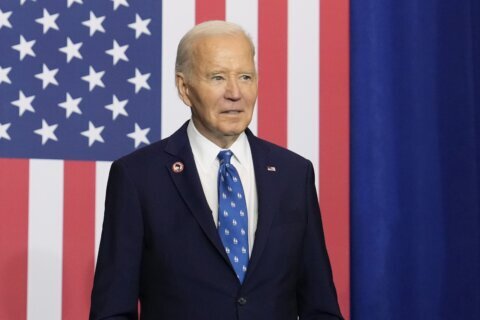What to know about the nine Black Greek-letter organizations
Black fraternities and sororities began to emerge at historically Black colleges and universities and on white college campuses during segregation, when even Black students at white institutions usually were excluded from Greek-letter organizations. Founders of Black fraternities and sororities valued the same scholarship, social and service aspects as their white counterparts, but with an added emphasis on social justice and uplift of African-Americans. Voter registration, tutoring, literacy, mentoring and other civic activities became traditions within Black Greek-letter organizations. Today, each of the “divine nine” — given that collective nickname by the National Pan-Hellenic Council umbrella organization — has chapters on college campuses across the U.S. and abroad. Five were founded at Howard University, an HBCU in Washington, D.C. Though historically and predominantly Black, all nine are open to non-Black members. Here’s an introduction to these fraternities and sororities and some of their famous initiates.
Alpha Kappa Alpha
Alpha Kappa Alpha is the oldest Black sorority, established in January 1908 at Howard. The ivy leaf became a symbol of the sorority — and the sisters known as “Ivies” — based on a sorority tradition of planting ivy on the school’s campus. One of the sorority’s main focuses is empowerment of girls and women. Famous AKAs include actresses Phylicia Rashad and Loretta Devine, singer Vanessa Bell Calloway, author Toni Morrison, media personality Star Jones and U.S. Vice President Kamala Harris. Actress Zahara Jolie, daughter of Angelina Jolie, was initiated as an AKA at Spelman College in Georgia in 2023.
Alpha Phi Alpha
The first of the Black Greek-letter organizations, Alpha Phi Alpha was founded by seven young men in December 1906 at Cornell University in New York. It’s the only one with roots in an Ivy League institution. The fraternity was an early champion of educational opportunities and uplift initiatives for Black people, especially youth. Some well-known Alphas are actors Omari Hardwick and Hill Harper, singer-songwriter Lionel Richie, musician-composer Duke Ellington, educator-theologian-activist Cornel West, U.S. Supreme Court Justice Thurgood Marshall and civil rights icon Rev. Martin Luther King, Jr.
Delta Sigma Theta
Delta Sigma Theta was established at Howard in January 1913 by 22 female students, some of whom were previous members of AKA. The Deltas got involved in the women’s suffrage movement and in 1937 created the National Library Project, sending out one of the first bookmobiles in America. Famous Deltas include singers Natalie Cole and Roberta Flack, actresses Kim Coles and Keshia Knight Pulliam, Olympic medalist Wilma Rudolph, civil rights activist Dorothy Height and Shirley Chisholm, the first Black U.S. Congresswoman.
Iota Phi Theta
Iota Phi Theta, the youngest Black Greek-letter organization, was established in September 1963 at Morgan State University in Maryland by 12 men who were nontraditional students. The fraternity got involved in the Civil Rights Movement, often collaborating with organizations such as the NAACP and Southern Christian Leadership Conference. Famous members of this fraternity include actor T.C. Carson, musician-composer Bobby Rush, broadcaster Spencer Christian, producer-songwriter Kendrick Dean, higher education leader J. Keith Motley and NBA stars Elvin Hayes and Calvin Murphy.
Kappa Alpha Psi
Racial discrimination and social isolation on campus sparked the founding of this fraternity at Indiana University in January 1911. Originally named Alpha Omega and then Kappa Alpha Nu — and known for their nickname “the Nupes” — the frat brothers became known for hosting popular social events and emphasizing achievement. Their current name became official in 1915. Famous Kappas include filmmaker John Singleton, actor Lance Gross, civil rights leader Ralph Abernathy, singers Montell Jordan and Marvin Sapp, NFL star Colin Kaepernick and business mogul Robert Johnson, the first Black American billionaire.
Omega Psi Phi
Omega Psi Phi was established in November 1911 at Howard, the first fraternity founded at an HBCU. The fraternity took root and eventually went national, establishing nearly 50 chapters before incorporation in 1914. The Omegas have engaged in many civil rights and social justice efforts, such as securing fair employment for Black people. Among the most well-known “Ques” are surgeon and researcher Dr. Charles Drew, author Langston Hughes, radio host Tom Joyner, civil rights leader Jesse Jackson, entertainers Steve Harvey and Bill Cosby, comedian Rickey Smiley and pro athletes David Justice and Michael Jordan.
Phi Beta Sigma
This fraternity was established at Howard in January 1914 and soon got engaged with issues such as Black economic empowerment and support of anti-lynching legislation. Sigmas had a significant impact on the Harlem Renaissance, including author-scholar Alain Locke. Other famous Sigmas are writer James Weldon Johnson, activist-organizers A. Philip Randolph and Huey Newton, Congressman John Lewis, political pundit Armstrong Williams, gospel singer Kurt Carr, musician Everett Harp, broadcaster and motivational speaker Warren Ballentine, and pro athletes Lou Brock, Emmitt Smith and Jerry Rice.
Sigma Gamma Rho
During a period of racial hostility in Indiana, a group of seven educators established Sigma Gamma Rho sorority at Butler University in Indiana in November 1922. Members over the years became involved in social, cultural, health and youth initiatives. Among well-known SGR initiates are Olympic medalist Carmelita Jeter, Miss USA 2016 Deshauna Barber, PGA Hall of Fame golfer Renee Powell, and Sandra Bland, whose death in a Texas jail cell after a 2015 traffic stop put a national spotlight on police reform.
Zeta Phi Beta
This sorority was founded at Howard in January 1920 and is the first Black sorority to be constitutionally bound to a fraternity — Phi Beta Sigma. Other Black fraternities and sororities would subsequently pair up as brother-sister organizations. Like other Black Greek-letter organizations, the Zetas have championed education and community uplift. Famous Zetas include author Zora Neale Hurston, singers Towanda and Traci Braxton, comedienne Sheryl Underwood, Olympic medalist Lillie Leatherwood, U.S. ambassador Beatrice Welters and Dr. Monica Frazier Anderson, an author and motivational speaker.
The 9 Black Greek-letter organizations
Alpha Kappa Alpha
Alpha Phi Alpha
Delta Sigma Theta
Iota Phi Theta
Kappa Alpha Psi
Omega Psi Phi
Phi Beta Sigma
Sigma Gamma Rho
Zeta Phi Beta
Explore college fraternities and sororities
Learn more about college Greek life and campus life, and connect with U.S. News Education on Facebook and X/Twitter to get more advice on making the college decision.
More from U.S. News
Common Black College Application: What to Know
How to Thrive as an HBCU Student-Athlete
Diversity Questions for Colleges: What to Ask
Meet the Black Greek-Letter Organizations originally appeared on usnews.com







